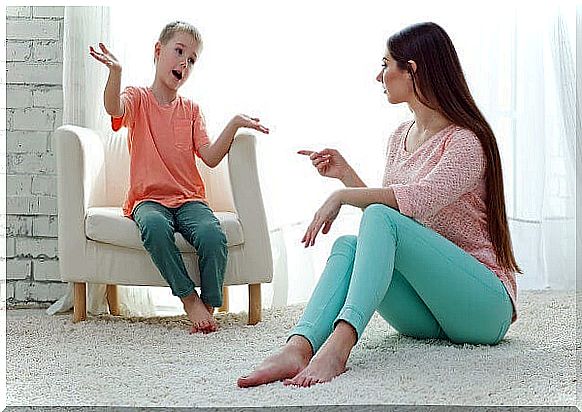How To Discipline Children Without Yelling

Many parents yell at their children at one point or another when they misbehave out of frustration. Most of them have lived as children the screaming of their parents at home and see it as something normal. And even more so when they see that other parents around them also yell at their children and talk about it with all the naturalness in the world. But can children be disciplined without yelling?
The truth is that yes, you can discipline children without yelling. In fact, yelling as a discipline strategy is one of the fastest ways to make behavior problems worse in children. In addition, yelling ends up becoming a bad habit that makes dialogue and coexistence difficult, because it becomes the standard form of reaction to any situation that creates frustration.
Maybe you can yell at your kids’ attention, you might even get something from them right then and there. But you’re really only causing the behavior problems to increase. This is due, among other reasons, to the fact that you are teaching your children that the way to manage conflict and deal with frustration is through yelling and verbal violence.

Establish clear rules
Setting clear rules about what you expect of your children will make you less likely to have to resort to yelling. If children have trouble remembering household rules, it is a good idea to have a written list of those rules in a conspicuous place. This will also serve as a reminder for adults.
This written list reminds children of what is expected of them. It also serves as a good reminder for parents about what behaviors need to be addressed. Revise the list as needed to adapt it to new needs. If the children are young and cannot read, use pictures and icons.
Explain the negative consequences before
You should explain the negative consequences for breaking the rules to your child ahead of time so that it is clear how you are going to enforce the rules. These consequences can be the use of waiting time, taking away privileges or using logical consequences to help the child learn from their mistakes.
Based on this, create a plan to manage the misbehavior with strategies whose consequences are likely to be most effective. Use these strategies when you are tempted to raise your voice. Remember that if you want this to work, you must apply disciplinary measures from the first moment. If not, all this won’t do any good.

Provide positive reinforcement
Encourage your child to follow the rules through positive reinforcement. If there are negative consequences for breaking the rules, there should also be positive consequences for following them. Praise your child when he behaves well and does what is expected of him. This can help prevent behavior problems.
In addition, you should give your child lots of positive attention to reduce negative attention-seeking behaviors. If your child struggles with certain behavior problems, create a reward system.
Examine the reasons why you yell
If you find yourself yelling at your children too often you should analyze why. Many parents take their stress and frustration out on their children, even if they are not entirely to blame. Other times the yelling has simply become a habit and is more of an outlet or, simply, a toxic routine is entered.
Learn strategies to calm your emotions and manage anger in a healthy way. This will also serve as a model for your child, so that he also learns to control his impulses.
If she’s yelling because you feel like your child isn’t listening, try new strategies to get your child’s attention. Make sure you are giving effective instructions instead of repeating to yourself that your child won’t listen.
Warn before taking action
Instead of yelling at him, send your child a warning when he is not listening. Remind him of what will happen if he does not attend or does not do his part. If you shout what you do is establish a power struggle from which nothing positive will come out.
The more a child is yelled at, the more likely he is to become defiant. However, by providing a warning of what you will accomplish, you show your child that you mean business. Once again you have to remember that you have to comply with those warnings if the child does not comply.









